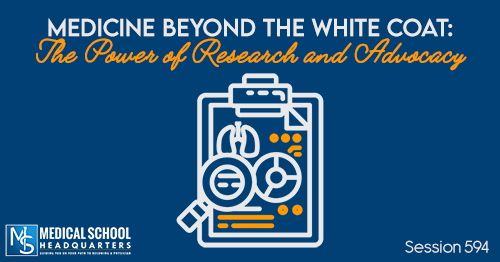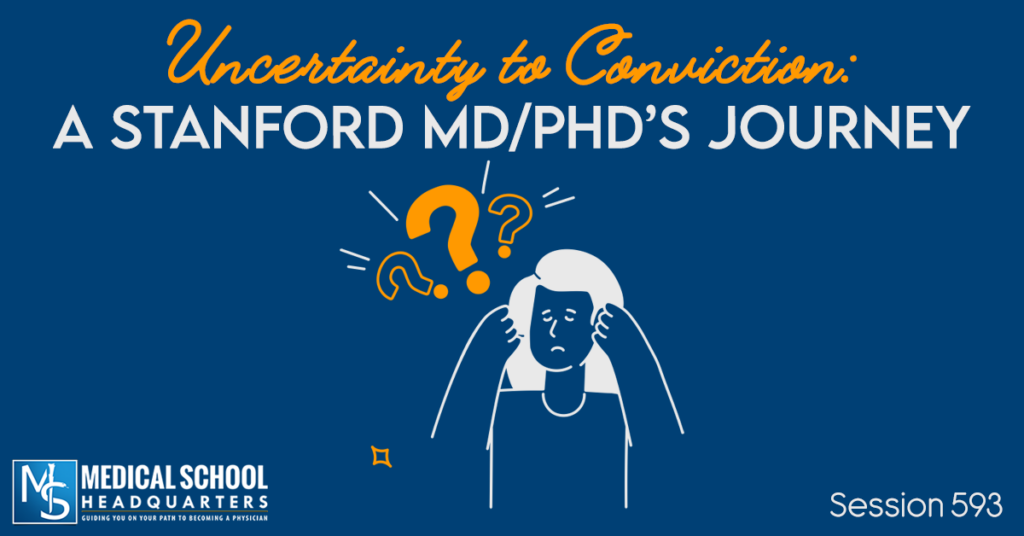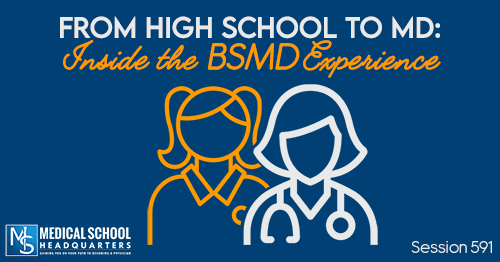So, you’ve taken the MCAT. You’ve applied to the perfect number of medical schools and crushed your secondary essays. You are now ready for the medical school interview process.
For my comprehensive book on medical school interview, check out The Premed Playbook: Guide to the Medical School Interview (that’s an Amazon link). But today we’re covering ten of the most common medical school interview questions you’re likely to receive and how to answer them.
You should practice answering each of the following questions. Ask a friend, advisor, teacher or parent to sit down with you to practice answering questions. It is not a bad idea to record yourself so you can get feedback. I created an Anytime Mock Interview Platform to help with this. I also offer 1-on-1 mock interviews with me personally.
10 Commonly Asked Medical School Interview Questions
1. Why do you want to be a doctor?
Be honest. Unless, of course, you only want to be a doctor because of money—that’s the wrong reason to go into medicine. Generally, focus on how you want to impact patients as a physician.
Tell stories of patients that have moved you to want to become a physician and why. If you still don’t know what to say, check out this full podcast episode of me discussing this question.
2. When did you decide that you wanted to go to medical school?

So try to give a personal twist on why you decided you to want to be a doctor. This will make you more memorable.
3. Why do you want to go to our medical school?
The answer might be simple in your mind: “Because you’re the only school that is interviewing me!” Please don’t say that. Do your homework about the school. Look at the school’s website and their residency match list, and pick out things you can talk about.
Do some research about the hospitals that they are affiliated with. Try to find well-known alumni of the school, and discuss their paths to medicine and how you may want to follow. Cite specific programs and local opportunities, as well as any support system you have in the area.
4. Why do you think our medical school would be a good fit for you?
This will take some time on your part, similar to the last question. Learn about the school. Learn about their faculty, their facilities, and their affiliated hospitals. Do they have a nice, quiet location that will help you study, or are they in a busy city? In which environment will you be able to study effectively and succeed?
5. What would you do if you weren’t accepted to medical school?
Know your application. Be able to discuss how you’ll strengthen your application if you aren’t accepted the first time. As an example, some applicants who get rejected will do research or get a job in health care as an EMT or medical assistant, then reapply in a year or two. Also, have an answer prepared for whether or not you would consider another profession if you didn’t get into medical school.
6. What do you think are the biggest problems with our current health care system?
It is very important to stay abreast of current events in health care when on the interview trail. With all the debate over health care in the U.S. today, there may be national news that interviewers want you to talk about. Being a physician today requires a lot more business savvy than ever before.
It’s great if you know how health care works and have ideas about how it could be fixed. Listen to this podcast episode for an overview of the Affordable Care Act and some issues being debated in health care in recent years.
7. What do you think are the most important characteristics of a physician?
You might think “everything about me, obviously,” but again, this is not the right answer. Think about what you would want in a physician treating one of your family members. Would you want a hard worker, someone who is the smartest person around, or maybe just somebody who cares?
Whatever you think it is, answer honestly. Then back it up with why you think that. For some ideas, listen to my podcast episode about the top habits and attitudes of humanistic physicians.
8. Discuss your clinical experiences.
If you’re like me, you won’t remember too much from your clinical experiences without keeping a journal. (My wife tells me I don’t have the best memory.) So keep a journal of your clinical experiences. While you are shadowing or volunteering in a clinic, at some point each day, write down everything you did and everything you saw.
Was there one particularly interesting patient? A rare diagnosis? Did the doctor let you do anything for the first time? If so, how did that make you feel? Not only are these great experiences to talk about during your interview, but they make memories which you can draw upon for your personal statement.
9. Discuss your research experiences.
Similar to the tip for the last question, journal about all of your research accomplishments along the way. Don’t just talk about the results. Be able to talk about the journey. Discuss any mistakes that you were able to overcome. It’s easy to look at the end result of research, but it’s the path to that result that will be more memorable and make you stand out.
10. Ethical questions about abortion, euthanasia, and stem cell research.
These are some of the more popular questions to ask because they allow the interviewer to get a sense of your thinking and your beliefs. There are no right answers here. Remember, though, as a physician you may be treating people with different beliefs than you.
You need to be able to communicate that while you have your beliefs, you understand that not everybody shares them, and you can still respect and treat those patients equally and to the best of your ability. For more discussion of medical ethics questions you might be asked, listen to this podcast episode.
More Common Medical School Interview Questions
Even with the ten questions above, we still didn’t cover “tell me about yourself” or “what are your greatest strengths?” For more medical school interview questions, check out “5 Common Med School Interview Questions and How to Answer Them.”
Links and Other Resources
- Check out my book about the medical school interview: The Premed Playbook: Guide to the Medical School Interview.
- Related episode: How Should I Approach the “Blind” Medical School Interview?
- Related episode: Do I Have to Know Laws or Specific Medicine for the MMI?
- Need MCAT Prep? Save on tutoring, classes, and full-length practice tests by using promo code “MSHQ” at Blueprint MCAT (formerly Next Step Test Prep)!






